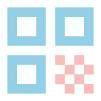Blockchain
Blockchain is a continuous sequential chain of blocks (linked list) built according to certain rules, containing any information (English Blockchain or block chain = chain of blocks).
The term Blockchain first appeared as the name of a distributed database implemented in the Bitcoin system, which is why blockchain is often associated with the transaction registry in various cryptocurrencies. At the same time, the block chain technology can be extended to any interconnected information blocks. The relationship between blocks is ensured not only by numbering, but also by the fact that each block contains its own hash sum and the hash sum of the previous block (checksum). Changing any information in a block will change its checksum. To comply with the rules for constructing a chain, changes to the hash sum will need to be written to the next block, which will cause changes to its own hash sum. In this case, the previous blocks are not affected. If the block being changed is the last one in the chain, then making changes may not require significant efforts. But if after the block being changed there is already a continuation of the chain of blocks, then the change may be a very labor-intensive process, since the information blocks can be located in different databases, on different computers and storage media.
Currently, blockchain technology is actively developing and is used in such areas as cybersecurity, control of financial transactions, user identification, production tracking, protection of products and brands from counterfeiting. For product manufacturers, Blockchain technology provides the ability to control the integrity of data from the purchase of raw materials to the delivery of finished products to the buyer and the provision of guarantees and service.













